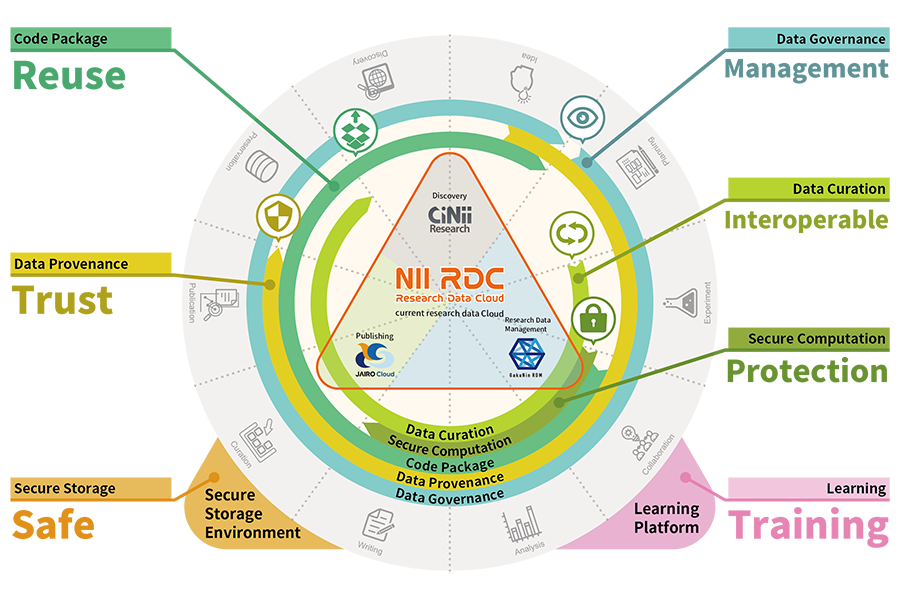- HOME>
- Projects>
- Overview of Our Projects
Overview of the NII Research Data Cloud
The NII Research Data Cloud (NII RDC) is an information platform that supports open science and research integrity and promotes data-driven research. The NII RDC consists of three platforms that match the lifecycle of research data: research data management platform (GakuNin RDM), publishing platform (WEKO3), and discovery platform (CiNii Research). At RCOS, we began developing the NII RDC in 2017, and started its operation in 2021.
We started upgrading these three platforms from 2022 with regards to the following seven aspects in sequence with the aim to complete them by 2027: "Data Governance Function", "Data Provenance Function", "Code Package Function", "Secure Computation Function", "Secure Storage Environment", "Data Curation Function" , and "Learning Platform" .

In addition to the above, we continue to expand functions that contribute to open access and open science while also focusing on promoting the sharing and utilization of research data in the humanities and social sciences. In line with the "Research Data Ecosystem Development Project"![]() launched in 2022, we are also developing a wide range of initiatives to promote research DX nationwide, including the development of rules and guidelines and a curriculum to train human resources in research data management.
launched in 2022, we are also developing a wide range of initiatives to promote research DX nationwide, including the development of rules and guidelines and a curriculum to train human resources in research data management.
GakuNin RDM (Research Data Management Platform)
GakuNin RDM (Research Data Management Platform) is a cloud-based platform that enables researchers to efficiently manage and collaborate on research data within their projects.
WEKO3 (Publishing Platform)
WEKO3 (Publishing Platform) is a repository system for publishing research data and papers, which are the products of researchers.
CiNii Research (Discovery Platform)
CiNii Research (Discovery Platform) is a next-generation discovery service for cross-searching academic information published in our publishing platform and other repositories.
Data Governance Function
This function supports the creation and execution of research data management plans (DMP) and enables monitoring by institutions.
Data Provenance Function
This function enables researchers using data to check the historical record trail that accounts for the origin of the data, and researchers providing data to check the usage of their own data.
Code Package Function
This function enables researchers to group together data, programs, and execution environment definitions as a "computational reproduction package" for publication and re-use.
Secure Computation Function
This function allows data to be analyzed in encrypted form, in cases where the data provider does not authorize the data to be disclosed.
Secure Storage Environment
It provides ultra-ironclad storage with dedicated hardware and advanced encryption technology, enabling both sharing and protection of data in research projects that handle sensitive information.
Data Curation Function
We will build a human network infrastructure of data curators and provide researchers with specialized curation services in their fields.
Learning Platform
This platform provides materials for learning the skills required to manage research data and an environment that allows you to track learners' progress.
Open Access Assist System
This system promotes open access in a labor-saving way of notifying information about papers written by affiliated researchers and the policies of the journals in which they have been published.
Promote the Use in Humanities and Social Sciences
We promote the use of research content in the humanities and social sciences, which is difficult to be made public due to licensing, confidentiality, and privacy information.
Research Data Ecosystem Development Project
This is a project of the Ministry of Education, Culture, Sports, Science and Technology (MEXT) to promote the nationwide transformation of research activities via the use of digital technology and data (Research DX), with the aim of advancing the "formation and dissemination of use cases", "promotion of data sharing and utilization", and "effective use of digital research infrastructure, etc." in an integrated manner.





